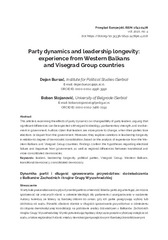Приказ основних података о документу
Party dynamics and leadership longevity: experience from Western Balkans and Visegrad Group countries
| dc.creator | Bursać, Dejan | |
| dc.creator | Stojanović, Boban | |
| dc.date.accessioned | 2023-11-22T18:33:24Z | |
| dc.date.available | 2023-11-22T18:33:24Z | |
| dc.date.issued | 2020 | |
| dc.identifier.issn | 1641-2478 | |
| dc.identifier.uri | http://rifdt.instifdt.bg.ac.rs/123456789/3447 | |
| dc.description.abstract | This article is examining the effects of party dynamics on changeability of party leaders, arguing that significant differences can be expected with regard to ideology, parliamentary strength, and involvement in government. Authors claim that leaders are more prone to change, when their parties lose elections or depart from the government. Moreover, they explore variations in leadership longevity in relation to degree of democratic consolidation, based on the analysis of experience from the Western Balkans and Visegrad Group countries. Findings confirm the hypotheses regarding electoral failure and departure from government, as well as regional differences between transitional and more consolidated democracies. | sr |
| dc.language.iso | en | sr |
| dc.publisher | Faculty of Political Science and International Studies, University of Warsaw | sr |
| dc.rights | openAccess | sr |
| dc.rights.uri | https://creativecommons.org/licenses/by/4.0/ | |
| dc.source | Przegląd europejski | sr |
| dc.subject | leaders | sr |
| dc.subject | leadership longevity | sr |
| dc.subject | political parties | sr |
| dc.subject | Visegrad Group | sr |
| dc.subject | Western Balkans | sr |
| dc.subject | transitional democracy | sr |
| dc.subject | consolidated democracy | sr |
| dc.title | Party dynamics and leadership longevity: experience from Western Balkans and Visegrad Group countries | sr |
| dc.type | article | sr |
| dc.rights.license | BY | sr |
| dc.citation.issue | 4/2020 | |
| dc.citation.spage | 105 | |
| dc.citation.epage | 116 | |
| dc.identifier.doi | 10.31338/1641-2478pe.4.20.8 | |
| dc.type.version | publishedVersion | sr |
| dc.identifier.fulltext | http://rifdt.instifdt.bg.ac.rs/bitstream/id/11857/bursac_stojanovic_leadership_longevity.pdf |

